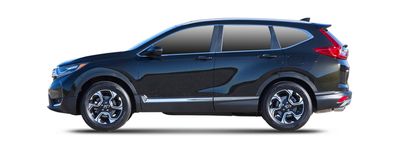Table of Contents
Honda CR-V engines
Since its launch in 1995, the Honda CR-V has become one of the most successful compact SUVs in the world, offering a diverse range of Honda CR-V engines across five generations. Each generation has brought new technologies and different strengths and weaknesses, with Honda always relying on proven naturally aspirated engines and later on advanced hybrid technology.

Honda CR-V engines: Historic generations I-II (1995-2006)

The first two Honda CR-V generations established the foundation for the brand in the compact SUV segment and were characterized by exceptionally robust, naturally aspirated engines. With proper maintenance, these Honda CR-V engines easily reached 400,000 to 500,000 kilometers - a mileage that is still impressive today. Major engine damage was practically unheard of, with only routine maintenance work such as changing the timing belt every 100,000 kilometers required. The absolute top engine of this era was the 2.0-liter DOHC i-VTEC from the second generation, which optimally combined reliability, smooth running and sufficient power. Honda deliberately dispensed with turbocharging and complex technologies, which was reflected in its exceptional longevity.
Honda CR-V gasoline engines: Historic generations I-II (1995-2006)
The first Honda CR-V generation (1995-2001) was offered exclusively with a 2.0-liter DOHC engine with 94 kW (128 hp). This Honda CR-V engine was based on the proven B20B technology and was considered practically indestructible. The second generation (2002-2006) received a more modern 2.0-liter i-VTEC engine (K20A) with 110 kW (150 hp), which used Honda's VTEC variable valve control. Both Honda CR-V engines were exclusively naturally aspirated without turbocharging, which explains their exceptional reliability. The second-generation K20A engine developed into the best gasoline engine of the early period - it not only offered more power, but also better running smoothness and lower fuel consumption than its predecessor.
| Honda CR-V engine | Power output | Fuel consumption | Typical weaknesses | Rating |
|---|---|---|---|---|
| 2.0 DOHC (Gen I) | 128 HP | 8.5-9.2 l/100km | Timing belt every 100,000 km | Very good |
| 2.0 i-VTEC (Gen II) | 150 HP | 7.8-8.5 l/100km | Practically no weaknesses | Very good |

Honda CR-V engines: Generation III (2007-2012)

The third Honda CR-V generation continued the tradition of reliable naturally aspirated engines and is considered one of the best generations ever. The Honda CR-V engines of this era easily reached 350,000 to 450,000 kilometers with proper maintenance, whereby the 2.0-liter i-VTEC was considered to be particularly durable. Major engine damage remained a rarity, with only the 2.4-liter engine occasionally showing problems with the timing chain after very high mileages. The absolute highlight was the 2.0-liter i-VTEC with 150 hp - a technical masterpiece that perfectly balanced power, efficiency and reliability. This generation also marked the beginning of the diesel era for the European market with the 2.2 i-DTEC.
Honda CR-V petrol engines: Generation III (2007-2012)
The Honda CR-V gasoline engine range included two proven i-VTEC engines: the 2.0-liter with 110 kW (150 hp) and the 2.4-liter with 140 kW (190 hp). The Honda CR-V 2.0 i-VTEC (R20A) continued the success story of its predecessor and proved to be exceptionally reliable with smooth power delivery. The larger Honda CR-V 2.4 i-VTEC (K24Z) offered more power for sporty drivers, but occasionally showed weaknesses in the timing chain after very high mileages of over 300,000 kilometers. Both Honda CR-V engines continued to be naturally aspirated engines without turbocharging, which was the reason for their legendary reliability.
Honda CR-V diesel engines: Generation III (2007-2012)
For the first time, Honda offered a Honda CR-V diesel for the European market: the 2.2 i-DTEC with 110 kW (150 PS). This Honda CR-V diesel engine was based on the latest common-rail technology with particulate filter and proved to be surprisingly reliable for a first-generation engine. The Honda CR-V 2.2 i-DTEC offered excellent power delivery and low fuel consumption, with only the particulate filter requiring occasional regeneration trips on the highway. This engine developed into the best diesel in Honda CR-V history and offered a rare combination of efficiency and reliability.
| Honda CR-V engine | Power output | Fuel consumption | Typical weaknesses | Rating |
|---|---|---|---|---|
| 2.0 i-VTEC | 150 HP | 7.2-8.0 l/100km | Practically no weaknesses | Very good |
| 2.4 i-VTEC | 190 HP | 8.1-8.8 l/100km | Timing chain after 300,000+ km | Good |
| 2.2 i-DTEC | 150 HP | 5.8-6.5 l/100km | Particulate filter regeneration | Very good |

Honda CR-V engines: Generation IV (2012-2018)

The fourth Honda CR-V generation marked a turning point in engine development, introducing turbocharging for the first time in Europe while retaining the proven naturally aspirated engines. The Honda CR-V engines of this generation reached 300,000 to 400,000 kilometers with proper maintenance, with the naturally aspirated engines remaining more reliable than the new turbocharged engines. The 1.6 i-DTEC diesel proved problematic with frequent injector problems and particulate filter blockages, while the tried and tested 2.0 i-VTEC retained its reliability. The absolute top engine of this generation was the 2.4 i-VTEC with 185 hp - it offered the best combination of performance and durability. This generation also heralded the end of the diesel era as Honda increasingly focused on hybrid technology.
Honda CR-V petrol engines: Generation IV (2012-2018)
The Honda CR-V petrol range was expanded to include a 1.5 VTEC Turbo with 140 kW (190 hp), while the proven 2.0 i-VTEC with 114 kW (155 hp) and the 2.4 i-VTEC with 136 kW (185 hp) remained available. The Honda CR-V 1.5 VTEC Turbo was Honda's first approach to turbo technology and showed typical teething troubles: occasional problems with fuel dilution of the engine oil on short journeys and turbocharger damage after high mileage. The Honda CR-V 2.0 i-VTEC remained the most reliable engine of this generation, while the 2.4 i-VTEC offered the best balance of performance and reliability.
Honda CR-V diesel engines: Generation IV (2012-2018)
The new Honda CR-V 1.6 i-DTEC with 88 kW (120 hp) and 118 kW (160 hp) replaced the proven 2.2-liter diesel and proved to be significantly more problematic. These Honda CR-V diesel engines suffered from frequent injector problems, particulate filter blockages and problems with exhaust gas recirculation. The Honda CR-V 1.6 i-DTEC developed into the most problematic engine in the entire CR-V history and ultimately led Honda to discontinue diesel development. Many owners reported costly repairs after just 80,000 to 120,000 kilometers.
| Honda CR-V engine | Power output | Fuel consumption | Typical weaknesses | Rating |
|---|---|---|---|---|
| 2.0 i-VTEC | 155 HP | 7.0-7.8 l/100km | Proven reliability | Very good |
| 2.4 i-VTEC | 185 HP | 7.8-8.5 l/100km | Best balance performance/reliability | Very good |
| 1.5 VTEC Turbo | 190 HP | 6.8-7.5 l/100km | Oil dilution, turbocharger damage | Moderate |
| 1.6 i-DTEC | 120-160 HP | 4.8-5.5 l/100km | Injectors, particulate filter, EGR | Problematic |

Honda CR-V engines: Generation V (2018-today)

The current Honda CR-V generation relies entirely on hybrid technology and represents Honda's future vision for efficient drives. All engines are now equipped with hybrid technology, the turbo petrol engines have been further developed and the diesel has been completely discontinued. As some variants have only been on the market since 2019, there is no complete long-term experience yet, but the first tests show promising approaches. The top-of-the-range engine is the 2.0 i-MMD hybrid with 184 hp system output, which combines sporty driving performance with exceptional efficiency. The hybrid technology promises a service life of over 300,000 kilometers, as the electric system relieves the combustion engine.
Honda CR-V petrol engines: Generation V (2018-today)
The basis of the Honda CR-V engine range is the further developed 1.5 VTEC Turbo with 142 kW (193 PS). This Honda CR-V engine has been significantly improved compared to its predecessor and the problems with oil dilution have largely been solved. The Honda CR-V 1.5 VTEC Turbo is considered to be significantly more reliable than its predecessor and is developing into the best turbo engine in CR-V history - it offers smooth power delivery and has so far been largely free of major production problems.
Honda CR-V hybrid drives: Generation V (2018-today)
The Honda CR-V 2.0 i-MMD Hybrid with 135 kW (184 hp) system output combines a 2.0-liter naturally aspirated Atkinson engine with two electric motors. This Honda CR-V Hybrid technology has a much simpler design than its German competitors and does without a complex gearbox. The Honda CR-V Hybrid proves to be exceptionally economical with a real-world fuel consumption of just 5.5-6.2 liters per 100 km and offers impressively smooth running. Initial long-term experience shows that the hybrid components are highly reliable.
| Honda CR-V engine | Power output | Fuel consumption | Typical weaknesses | Rating |
|---|---|---|---|---|
| 1.5 VTEC Turbo | 193 HP | 6.5-7.2 l/100km | Significantly improved, few problems | Good |
| 2.0 i-MMD Hybrid | 184 HP | 5.5-6.2 l/100km | Very reliable, economical | Very good |

Conclusion: The best Honda CR-V engines of all generations
The development of the Honda CR-V engines clearly demonstrates Honda's philosophy of continuous progress - while the early naturally aspirated engines shone with exceptional reliability, the diesel experiments struggled with problems before Honda successfully switched to hybrid technology. The new hybrid generation promises a return to the virtues of the early CR-V engines: high reliability combined with modern efficiency.
- Best Honda CR-V gasoline engine:
The Honda CR-V 2.0 i-VTEC (Generation III, 150 hp) combines legendary reliability with ample power and low fuel consumption - an engine that easily manages 400,000+ kilometers.
- Best Honda CR-V diesel engine:
The Honda CR-V 2.2 i-DTEC (Generation III, 150 hp) remains the only truly reliable diesel in CR-V history, offering excellent power delivery with low fuel consumption.
- Best Honda CR-V hybrid engine:
The Honda CR-V 2.0 i-MMD Hybrid (Generation V, 184 hp) with its simple but effective hybrid technology and exceptional fuel economy with high reliability.
For maintenance and spare parts for all Honda CR-V generations, AUTODOC offers a comprehensive range of original and quality spare parts with fast delivery.
TOP Products on the topic:















